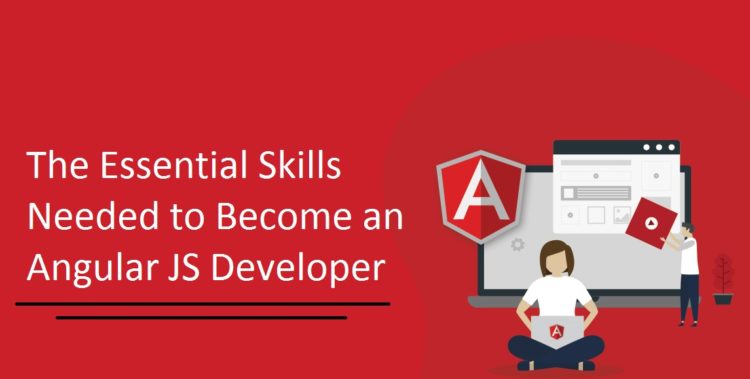The Essential Skills Needed to Become an Angular JS Developer

AngularJS is a well-known and powerful JavaScript framework for developing dynamic web applications. As an AngularJS developer, you must have a thorough grasp of the language’s fundamental principles and functionalities. In this article, we’ll go through the abilities you’ll need to become an AngularJS developer.
What is AngularJS?
AngularJS is a JavaScript front-end development framework that helps developers build dynamic web applications with ease. It was created by Google in 2010 and is extensively used by developers throughout the world. As per StackOverflow Statistics 2022, Angular is utilized more by proficient programmers, and it is preferred by 20.39% of them invested in front-end development. It is built on the Model-View-Controller (MVC) architecture and employs a declarative programming methodology to construct applications.
Why Use AngularJS?
There are several reasons why developers choose to use AngularJS, among all other web development framework for building web applications. Here are some of the key benefits of using AngularJS:
1. Easy to Use
AngularJS allows developers to create web apps with less lines of code. It includes tools and features that help to ease the development process, including two-way data binding, dependency injection, and directives.
2. Powerful data binding
AngularJS offers powerful data binding capabilities that enable developers to create dynamic and responsive user interfaces. With AngularJS, data binding enables for automated synchronisation between the model and the view, which simplifies code and improves speed.
3. Modular architecture
AngularJS employs a modular design that facilitates the organisation and maintenance of large-scale applications. Developers may design reusable components that can be readily used across different portions of the program by dividing up an application into smaller modules.
4. Dependency injection
Dependency injection is an important element of AngularJS that aids in the management of dependencies between components. Developers may use dependency injection to create dependencies across distinct components, and AngularJS will automatically inject such dependencies when they are required.
5. Rich set of features
AngularJS has a plethora of capabilities that make it simple to create complicated online apps. Built-in support for forms and input validation, routing, animation, and HTTP services are among the features.
6. Large community and ecosystem
AngularJS has a big and active community of developers that contribute to its development and give help to other developers. Moreover, AngularJS has a wide ecosystem of tools and frameworks that may simplify development and enhance productivity.
Overall, AngularJS is a robust and adaptable framework with several features and benefits for developing online apps. It provides the tools, Angularjs frameworks, and useful features you need to construct high-quality, responsive, and scalable online apps, whether you are building a tiny prototype or a large-scale corporate application.
Key features of AngularJS
AngularJS comes with several key features that make it a popular choice among developers. These features include:
- Two-way data binding
- Dependency injection
- Directives
- MVC architecture
- Templates
- Routing
- Animations
Essential Skills for AngularJS Developers
To become an AngularJS developer, you need to have a strong understanding of several key skills.
JavaScript
AngularJS is built on the JavaScript programming language. As an AngularJS developer, you must be well-versed in JavaScript essentials such as functions, variables, data types, and control structures.
HTML/CSS
HTML and CSS are the foundations of web development. To create user interfaces as an AngularJS developer, you must have a thorough grasp of HTML and CSS.
TypeScript
TypeScript is a JavaScript superset that includes features like static typing, classes, and interfaces. AngularJS employs it to improve code structure and maintainability.
MVC Architecture
The Model-View-Controller (MVC) architecture underpins AngularJS. As an AngularJS developer, you must grasp the architecture and how it pertains to web development.
Git and Version Control
Git is a common version control system that developers use to manage code changes. As an AngularJS developer, you must be well-versed in Git and version control techniques.
Testing
Testing is a critical component of software development. As an AngularJS developer, you must be well-versed in testing techniques and how to construct unit tests for your code.
Angular CLI
The Angular CLI is a command-line interface that offers a set of tools and functionality for developing, building, and testing AngularJS applications.
Dependency Injection
Dependency injection is a key feature of AngularJS that helps to manage dependencies between components. As an AngularJS developer, you need to have a strong understanding of dependency injection and how it is used in AngularJS.
RxJS
AngularJS uses RxJS, a reactive programming library, to handle asynchronous operations. As an AngularJS developer, you need to have a strong understanding of RxJS and how it is used in AngularJS.
Angular Material
Angular Material is a UI component framework that assists developers in creating visually appealing and responsive online apps. As an AngularJS developer, you must understand Angular Material and how to use its components.
Performance Optimization
Performance optimisation is a critical component of web development. As an AngularJS developer, you must be well-versed in performance optimisation strategies and their application to AngularJS apps.
Best Practices for AngularJS Development
In addition to the required abilities described above, there are some best practises that should be followed when a firm hires a dedicated Angularjs developer to fulfil all vital goals and obtain a trustworthy and effective solution. This are all of the important practises for Angular programmers:
Code Organization
Code organisation is critical for code readability and scalability. As an AngularJS developer, you should adhere to a consistent and logical code structure.
Naming Conventions
Using consistent and meaningful naming conventions for your variables and functions makes your code more readable and understandable. As an AngularJS developer, you should adhere to the AngularJS style guide’s naming standard.
Security
Web development requires a high level of security. As an AngularJS developer, you should adhere to best practises for app security, such as input validation, authentication, and permission.
Accessibility
Accessibility is essential for ensuring that individuals with impairments can use your online apps. As an AngularJS developer, you should adhere to accessibility best practises such as providing alternate text for pictures and utilising semantic HTML.
Conclusion
To summarise, becoming an AngularJS developer necessitates a solid grasp of various important abilities, such as JavaScript, HTML/CSS, TypeScript, MVC architecture, Git and version control, testing, Angular CLI, dependency injection, RxJS, Angular Material, and performance optimisation. Following best practises for code organisation, naming conventions, security, and accessibility is also essential for creating robust and scalable applications.
FAQs
What is AngularJS, and why is it popular?
AngularJS is a well-known JavaScript framework for creating dynamic web applications. It is popular because it enables developers to quickly and efficiently create web apps.
What programming languages should I learn to become an AngularJS developer?
To become an AngularJS developer, you should have a strong understanding of JavaScript, HTML, and CSS.
What is the MVC architecture?
The MVC architecture is a web development architectural pattern that divides an application into three interrelated components: the model, the view, and the controller.
Would you like to receive similar articles by email?






4 Comments
Erma Winter
Thanks for the sharing such a niece peace of article
Paul Tomaszewski
You’re very welcome!
Alexa Smith
I’m looking to become an app developer. Thanks for the tips.
Paul Tomaszewski
You’re welcome!